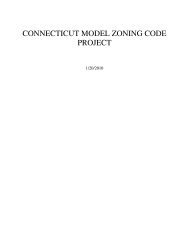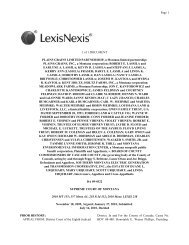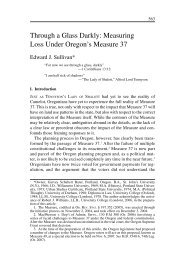LEXSEE DANIEL GUGGENHEIM; SUSAN ... - Land Use Law
LEXSEE DANIEL GUGGENHEIM; SUSAN ... - Land Use Law
LEXSEE DANIEL GUGGENHEIM; SUSAN ... - Land Use Law
You also want an ePaper? Increase the reach of your titles
YUMPU automatically turns print PDFs into web optimized ePapers that Google loves.
2010 U.S. App. LEXIS 25981, *31Page 10serve the purposes stated in the ordinance of protectingtenants from housing shortages and abusively high rentsor will undermine those purposes, is not for us to decide.We are a court, not a tenure committee, and are bound byprecedent establishing that such laws do have a rationalbasis. 52 Students in Economics 101 have for manydecades learned that rent control causes the higher rentsand scarcity it is meant to alleviate, 53 but the DueProcess Clause does not empower courts to imposesound economic principles on political bodies. 5452 See Pennell v. City of San Jose, 485 U.S. 1,13, 108 S. Ct. 849, 99 L. Ed. 2d 1 (1988) ("wehave long recognized that a legitimate andrational goal of price or rate regulation is theprotection of consumer welfare"); Equity LifestyleProps., Inc. v. County of San Luis Obispo, 548F.3d 1184, 1194 (9th Cir. 2008) ("The SupremeCourt and this Circuit have upheld rent controllaws as rationally [*32] related to a legitimatepublic purpose."); Carson Harbor Village Ltd. v.City of Carson, 37 F.3d 468, 472 (9th Cir. 1994),overruled on other grounds by WMX Techs. Inc.v. Miller, 104 F.3d 1133, 1136 (9th Cir. 1997)("A generally applicable rent-control ordinancewill survive a substantive due process challenge ifit is 'designed to accomplish an objective withinthe government's police power, and if a rationalrelationship existed between the provisions andthe purpose of the ordinances.'").53 See, e.g., William J. Baumol & Alan S.Blinder, ECONOMICS: PRINCIPLES ANDPOLICY 64-67 (2d ed. 1982).54 See Lochner v. New York, 198 U.S. 45, 75, 25S. Ct. 539, 49 L. Ed. 937 (1905) (Holmes, J.,dissenting) ("The Fourteenth Amendment does notenact Mr. Herbert Spencer's Social Statics.").The Guggenheims' equal protection theory is alsoforeclosed by precedent, 55 and would have no force evenif it were not, because only a rational basis is needed forthis ordinance, and mobile parks differ from most otherproperty in the separation of ownership of the land fromthe improvements affixed to the land. It is possible thatapplication of the ordinance by the arbitrator will violatesubstantive or procedural due process requirements,[*33] but that remains to be seen, if at all, in an as appliedchallenge to its application.55 Equity Lifestyle, 548 F.3d at 1195 (9th Cir.2008) ("This equal protection challenge must beconsidered under rational basis review becausemobilehome park owners are not a suspectclass.").AFFIRMED.DISSENT BY: Carlos T. BeaDISSENTBEA, Circuit Judge, dissenting, joined byKOZINSKI, Chief Judge, and IKUTA, Circuit Judge:I must respectfully dissent for two reasons.First, because the majority misapplies the SupremeCourt's analysis of regulatory takings claims. It ignorestwo essential elements of that analysis, and fails to followthe Court's instructions on the one element it uses todisqualify the claim. The majority impermissibly picksout only one of the three factors the Court has told us toconsider in determining whether a regulation effects ataking under the Penn Central test--whether the claimanthad "distinct investment-backed expectations"--andinexplicably disdains the other two. This converts athree-factor balancing test into a "one-strike-you're-out"checklist. Not content to rewrite one binding precedent,the majority ignores the Court's recent holding inPalazzolo that an investor can validly expect [*34] that aland control measure, in place when he invests, is notnecessarily eternal and therefore does not disqualify hisclaim of regulatory taking. Palazzolo v. Rhode Island,533 U.S. 606, 627, 121 S. Ct. 2448, 150 L. Ed. 2d 592(2001).Second, because it decides the substantive dueprocess and equal protection claims by citing rent controlcases. But, the Goleta ordinance is not a rent control lawfor the simple reason that it is not designed to--nor doesit--control rents. It does not just miss the mark because ofunintended consequences or inefficient administration. Itsvery structure was designed and intended not to providehousing rent control, but to transfer wealth from mobilehome park owners to one group of lucky tenants. Themeasure we deal with here is a wealth transfer, pure andsimple, with none of the features of rent control thoughtlegitimate governmental interests. As such, itsenforcement violates due process and equal protection.I. Background







